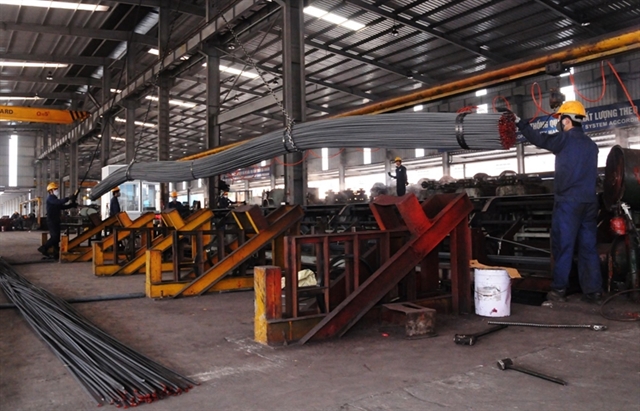Reducing the import tax for construction steel products will threaten domestic steel production, the Việt Nam Steel Association (VSA) has said.

Reducing the import tax for construction steel products will threaten domestic steel production, the Viet Nam Steel Association (VSA) has said.
In a draft of a decree submitted to the Government in mid-July to amend and supplement Decree 57/2020 on the Preferential Import-Export Tariff, the Ministry of Finance (MoF) proposed reducing the import tax for construction steel but increasing the export tariff for steel billets.
According to the draft, the import tax for some construction steel products will be cut to 10-15 per cent from a range of 15-25 per cent.
The import tax reduction will contribute to lowering the price of construction steel products helping businesses to reduce their costs, the MoF said, adding that a recent steel price increase had affected several projects, especially public investment projects.
Meanwhile, the ministry has proposed increasing the export tariff for steel ingot from 0 per cent to 5 per cent.
This export tax increase is aimed at stabilising the supply of steel billets for the domestic market, leading to stability in steel prices and limiting the export of steel billets for domestic steel production, according to the ministry.
Nghiem Xuan Da, VSA chairman, said the reduction of the import tax for construction steel was unnecessary as domestic steel production can meet local consumption and export demand. Local steel producers were also facing a number of COVID-19 related challenges.
"Import-export tariff policies are long-term policies to boost the domestic manufacturing sector, including the steel industry. Therefore, the Government needs to have a consistent policy to protect domestic production," Da said.
VSA and other large steel producers such as Viet Y Steel, Kyoei Viet Nam Steel, Phuong Nam Steel Sheet, Hoa Sen, Fomosa Ha Tinh and Hoa Phat have sent documents to the Government raising a number of challenges with implementing the new tariffs.
They have proposed the MoF and relevant agencies consider not increasing the export tax rate for steel ingot and not reducing the import tax for finished steel products.
According to VSA, since the outbreak at the end of April 2021, special distancing measures have forced a number of construction activities to be suspended, leading to a decrease in domestic steel consumption.
Specifically, sales of finished steel products in June on the domestic market decreased by 20 per cent month-on-month but increased only 1 per cent year-on-year.
Exporting steel is one solution to maintain production, and ensure jobs for workers. This will help to maintain economic development and bring in revenue for businesses, according to the association.
Many steel enterprises believe that they will have more difficulty and face the risk of having to stop production or even file for bankruptcy if the proposal is approved.
They said steel prices had been decreasing and were gradually stabilising, but sales volume was still slow and steel product inventories were increasing. As a result, many steel production enterprises had cut output by up to one third.
Steel prices were not only increasing in Viet Nam but also all over the world. The increase was expected to be short-term and the State should not use tax policy to deal with these short-term price fluctuations, a Hoa Sen Group representative said.
According to Nguyen Phu Duong, representative of the Viet Trung Minerals and Metallurgy Company (VTM), domestic construction demand has sharply reduced due to the COVID-19 pandemic, and the consumption of construction steel, for most brands, has been at a record low.
The domestic market has almost no demand for steel billets, while their selling price has decreased to near-production cost. Therefore, steel billet manufacturers must export their products to maintain their operations.
If the steel billets export tax is increased, manufacturers will face difficulty in selling their products.
According to a VSA report, steel ingot consumption in June reached more than 1.5 million tonnes, down 13.5 per cent month on month. Of which, steel ingot exports reached only 110,000 tonnes, down 66.7 per cent year on year. — VNS





